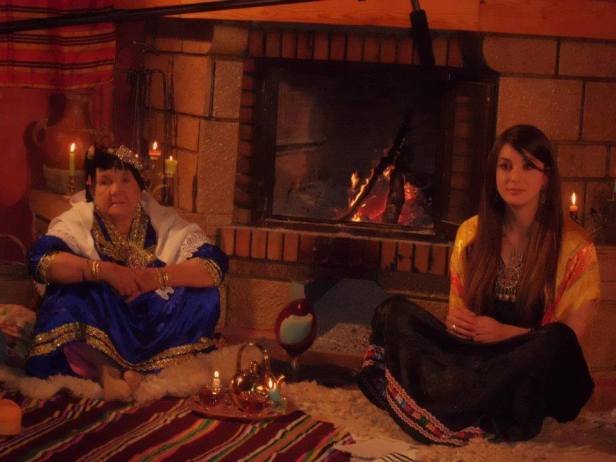Makilam is a Kabyle, a historian and a PhD. She was raised in a village of the Djurdjura ,in Kabylia ,until she was seventeen, and has since lived in Europe. She has always remained very close to her roots, and her testimony, interspersed with personal experiences, sheds completely new light on the rituals and myths of this vanishing society.
Birth of the grandchildren
When the first child gets married, the mother calls herself grandmother according to her new role, tamghart or the Crone. In Kabyle language this word expresses her very honourable position. At the same time her role as mother to her grown up children lasts to her death. In old Kabylia the mother cares for the children of her son turned father and at the same time assists her daughter-in-law in her mother role. This is carried out to such a degree that gifts at the birth of a child are handed to the grandmother, not to the mother or the father of the child. The relationship between a mother and a daughter is of utmost importance. The mother hands down all her knowledge to the daughter, the heiress of all the mother’s wisdom. She is endowed with a “special love”.
At the end of her life the grandmother is viewed as magic. In her womb she created human beings, who have been recipients of her nourishment and care. She turns into a weaver who is able to weave together the threads of life of the ancestors with those of the descendants. The crone was present at every fertility rite and directed all ritualistic-magical work. Based on her experience she often became a midwife and every evening recounted the myth and fairytales she had heard from her mother and passed them on along with her mother’s wisdom to her grandchildren.
Return to the earth
In Kabyle mythology, i.e. the narrative of The first parents of the world, human beings were born from the earth. In this way the Kabyles believe the dead return to the belly of the earth, where they came from. The funeral customs clearly show up, the return to the earth follows the same rituals, which leads by progressive stages to the birth of an infant. Any remains of the dead person have to be removed before the third day after the death occurred. Within those days the straying soul of the deceased is hovering over the threshold of the door of the house and will return after 40 days. The visit to the cemetery has to be conducted on the 3rd and the 40th day after the death. We find the observance of these magical 40 days after delivery and also after the funeral. In this way life takes on an eternal cyclical character, which is continually carried forward in the womb of the mothers. The funeral rituals make clear that death is not perceived as the end of life, but as the cyclical renewal, serving the renewal of all of life of nature, the earth and the heavens.
“In the perception of everybody, death is but a changeover in existence, a kind of transit time, and belief in a life after death is all encompassing. One does not say a person is “gone”, but that she or he is “heading for another world”, (teruh di-laxert), for the life down here and the future life is, we are assured, two sisters amazingly alike, whom we will get to know one after the other.” (Laoust-Chantréaux, p. 241)




Leave a Reply